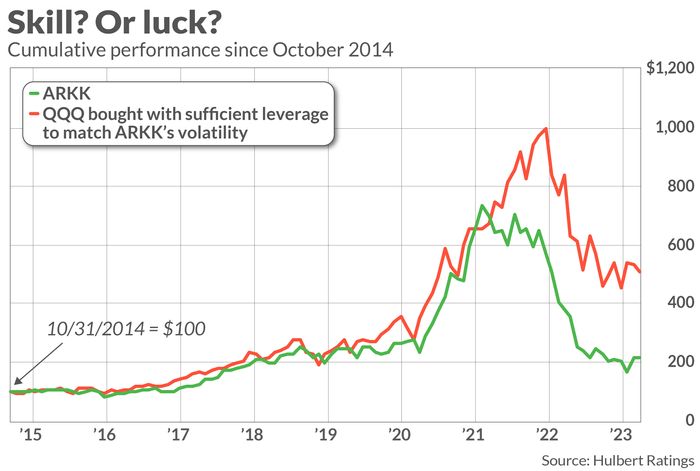Opinion: The real source of ARKK’s long-term performance

[ad_1]
The ARK Innovation ETF is a poor bet for performance when the market’s next major leg up begins.
I point this out not because I’m predicting that such a rally is about to begin, though, of course, it could at any time—even perhaps on Thursday of this week, when the Dow Industrials
DJIA,
exhibited impressive intraday strength and closed up more than 300 points. I mention the ETF’s poor odds instead to caution investors who are looking at recent performance as a guide to where to place their bets when a new bull market does finally take off.
The ARK Innovation ETF
ARKK,
certainly has attracted attention. Year to date through March 1 it gained 23.9%—in contrast to a 3.2% gain for the SPDR S&P 500 Trust
SPY,
which is benchmarked to the S&P 500, and a 9.4% gain for the Invesco QQQ Trust
QQQ,
which is benchmarked to the Nasdaq 100 Index
NDX,
There is less here than meets the eye, however. ARKK’s outperformance appears to be due in very large part to its willingness to incur well-above-average levels of risk and volatility. Investors over the years have received relatively little in return for incurring that risk. In fact, if you were willing to stomach the ETF’s high risk, you could have performed significantly better simply by investing in the Nasdaq 100 index with sufficient leverage to match ARKK’s volatility.
When outperformance during bull markets is attributable to risk, odds are overwhelming that the strategy will be a big casualty when the market declines. And that’s exactly what happened to ARKK over the last couple of years.
It’s not just Monday-morning-quarterbacking for me to say this.
Two years ago in this space, when ARKK was riding high, I argued that “ARK Innovation’s red-hot returns aren’t as impressive as they seem.” Since then, ARKK’s return has been minus 44.4% annualized, in contrast to minus 3.8% annualized for the QQQ.
An email to ARK Investment Management requesting comment was not immediately answered.
The accompanying chart updates the analysis I conducted two years ago. It compares ARKK’s performance since its October 2014 inception to a hypothetical portfolio that invested in the QQQ with just enough margin (79%, to be exact) to make its volatility the same as ARKK’s. In calculating this hypothetical portfolio’s performance, I deducted the interest cost of this margin.
As you can see, the leveraged-QQQ portfolio stayed neck and neck with ARKK up until the top of the meme-stock bubble in early 2021—which is when I wrote my two-years-ago column. Since then, this leveraged portfolio has pulled way ahead. I calculate that over the entire period since October 2014 the leveraged-QQQ portfolio beat ARKK by 12.0 annualized percentage points.
The investment implication of this finding: If you’re tempted to invest in ARKK in the next bull market, consider investing instead in the QQQ on margin. If history is any guide, you won’t incur any greater risk but will perform a lot better.
Mark Hulbert is a regular contributor to MarketWatch. His Hulbert Ratings tracks investment newsletters that pay a flat fee to be audited. He can be reached at mark@hulbertratings.com.
[ad_2]
Source link



